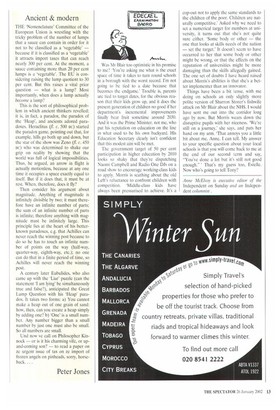Ancient & modern
THE 'Nomenclature' Committee of the European Union is wrestling with the tricky problem of the number of lumps that a sauce can contain in order for it not to be classified as a 'vegetable' — because if it is classified as a 'vegetable' it attracts import taxes that can reach nearly 300 per cent. At the moment, a sauce containing more than 20 per cent lumps is a 'vegetable'. The EU is considering raising the lump quotient to 30 per cent. But this raises a vital prior question — what is a lump? Most importantly, when does a lump actually become a lump?
This is the sort of philosophical problem in which ancient thinkers revelled; it is, in fact, a paradox, the paradox of the 'Heap', and ancients adored paradoxes. Heraclitus (fl. c. 500 ac) started the paradox game, pointing out that, for example, hills go both up and down, but the star of the show was Zeno (fl. c. 450 BC) who was determined to shake our grip on reality by showing that the world was full of logical impossibilities. Thus, he argued, an arrow in flight is actually motionless, because at any one time it occupies a space exactly equal to itself. But if it does that, it must be at rest. When, therefore, does it fly?
Then consider his argument about magnitude. Anything of magnitude is infinitely divisible by two; it must therefore have an infinite number of parts; the sum of an infinite number of parts is infinite; therefore anything with magnitude must be infinitely large. This principle lies at the heart of his betterknown paradoxes, e.g. that Achilles can never reach the winning post because to do so he has to touch an infinite number of points on the way (half-way, quarter-way, eighth-way, etc.); no one can do that in a finite period of time, so Achilles will never reach the winning post.
A century later Eubulides, who also came up with the 'Liar' puzzle (can the statement 'I am lying' be simultaneously true and false?), anticipated the Great Lump Question with his 'Heap' paradox. It takes two forms: a) You cannot make a heap out of one grain of sand: how, then, can you create a heap simply by adding one? b) 'One' is a small number. Any number bigger than a small number by just one must also be small. So all numbers are small.
Und now ve call on Philosopher Kinflock — or is it his charming vife, or upand-coming son? — to read a paper on ze urgent issue of tax on ze import of frozen angels on pinheads, sorry, horseback....
Peter Jones


















































































 Previous page
Previous page